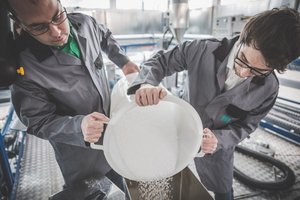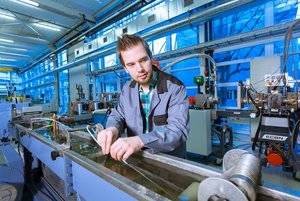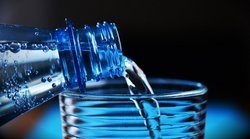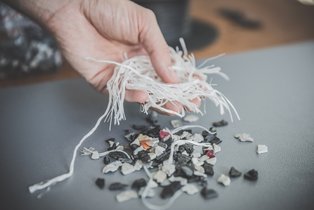In times of raw material scarcity and climate change, it is becoming increasingly important to deal effectively and efficiently with existing resources.
In the field of plastics recycling, there has been a rapid technical "upgrade" in recent years, as there are increasing demands to implement a circular economy. In this context, the Chair of Plastics Processing has specialized in the upcycling of (engineering) thermoplastics and in sustainability analysis (LCC/LCA).
Translated with www.DeepL.com/Translator (free version)
Winter sports equipment such as skis, ski boots, poles and helmets unfortunately end up in bulky waste at the end of their life and are thus lost as valuable raw materials for the manufacture of new products. The new interdisciplinary WINTRUST project now aims to lay the foundations for recycling winter sports equipment and putting it back into circulation.
Following the collection and dismantling of used winter sports articles from various project partners, processing and recycling tests are carried out on the separated materials at Montanuniversität Leoben. A life cycle analysis considers all steps of the process from the beginning in order to evaluate the ecological and economic feasibility of the trials and also to improve the planning of the trials.
Projectname: WINTRUST (Wintersport Resource Efficiency and improved Circular Economy)
Funding: FFG Collective Research
Consortium: ecoplus. Niederösterreichs Wirtschaftsagentur GmbHFachverband der HolzindustrieVSSÖ - Verband der Sportartikelerzeuger und SportartikelhändlerÖsterreichischer Carbon Cycle Circle AtomicBlizzardFischer SportsHEADLEKIBründl SportsGigasportIIC-INTERSPORT International Corporation GmbHAsma GmbH Gabriel-Chemie GroupGW St.Pölten Integrative Betriebe GmbHHexcel CorporationISOSPORT Verbundbauteile GmbHKRM Kunststoff - Recycling- Maschinen Next Generation Elements GmbHSUNPOR Kunststoff GmbHTHERMOPLASTKREISLAUF GMBH @ZEMKA Gesellschaft m. b. H. Transfercenter für Kunststofftechnik GmbHKunststofftechnik Leoben Montanuniversität Leoben (Lehrstühle für Kunststoffverarbeitung, Chemie der Kunststoffe sowie Verarbeitung von Verbundwerkstoffen und Design für Recycling)
The legal requirements of the EU for the circular economy pose great challenges for the Austrian textile industry, especially since textiles often consist of two or more materials, which makes material recycling very difficult.
In the course of the Tex2Mat project, a separation process based on an enzymatic process is to be developed for cotton-PET blended fabrics. The pure PET obtained in the process (from towels, hotel and hospital linen) is to be treated in such a way that it can be reused for the spinning process and ultimately for its original purpose.
The Tex2Mat project is funded by the Austrian Research Promotion Agency FFG within COIN, Cooperation and Networks, COIN Networks 9th call.
Further information in the Biennial Report 2017 - 2018 (p. 47)
In accordance with the funding line, the project aims at the training and international networking of 15 doctoral students from different disciplines ranging from chemistry, social sciences, political sciences and engineering to product design and business model development, complementing each other. In a holistic approach, these doctoral students are to build up a mutual understanding of the complex influencing factors and interrelationships for a functioning circular economy for plastic products and to advance this topic in Europe as future experts.
Project name: "Circular Plastics Network for Training" (C-PlaNeT)
Funding: Horizon 2020 MSCA-ITN-EJD (Marie Sklodowska-Curie Actions - Innovative Training Networks - European Joint Doctorates)
Project duration: 1.1.2020 to 31.12.2023
Consortium: Ghent University (Konsortialführer), Technische Universiteit Eindhoven, Technical University of Denmark, Technische Universität Berlin, Friedrich-Alexander-Universität Erlangen Nürnberg, Aristotle University of Thessaloniki, Katholieke Universiteit Leuven
In addition, the project is supported by internships and consulting from well-known companies and institutions, including: Fraunhofer Gesellschaft (D), Dow Benelux (NL), INEOS Styrolution (SUI), Novo Nordisk (DK), Plastics Europe (BE), Ellen McArthur Foundation (UK), Adidas (D), Kruschitz und Saubermacher (A)

Secondary raw materials in the plastics sector have so far hardly been used in high-quality functional components, as high quality requirements prevail here. The FFG COIN project "Rec²TecPart" aims to enable the use of secondary materials in this complex area for SMEs. With the help of a new value-added process, new goods are to be replaced by quality recyclates, so-called RecHQ, in a technically and economically sensible way. This means high resource efficiency and lower CO2 emissions. To this end, tailor-made feedstock for technically demanding applications is produced from plastic waste. This is done with a continuous process from the collection system to the plastics recycler to the plastics processor.
The process conversion can achieve a reduction in CO2 emissions of at least 25% as well as significant cost savings compared to the use of virgin material. Plastic waste thus becomes a recyclable material and a material at the same time. The next goal is to apply the Rec²TecPart process to large-scale industrial upcycling, for example in the automotive industry.
Further information in the 2013 - 2014 Biennial Report (p. 45)

Blast furnace and steel slags are a compulsory by-product of steel production and are normally landfilled. Due to their unique multiphase nature, completely new materials could be produced when mixed into polymer matrices.
The ongoing FFG-BRIDGE research project "PolySlag" is investigating the potential of blast furnace slag (BFS) as a functional filler for polypropylene (PP) and polystyrene (PS) as a sustainable alternative to mineral fillers. The initial results are promising: the rheological properties of the new BFS-filled polymer were comparable to the unfilled polymer, which means that no processing difficulties are to be expected. In terms of application-related properties, higher thermal conductivity and greater stiffness were achieved compared to the base polymer.
Partners: Polymer Competence Center Leoben GmbH (PCCL), voestalpine Stahl GmbH
Further information in the Biennial Report 2015 - 2016 (p. 23)

In the life cycle assessment of r²PET, the Chair of Plastics Processing was to determine how much CO2 eq. could be saved in Austria in 2017 if r²PET were used in the non-food sector instead of virgin PET.
Life cycle assessment is the systematic analysis of the environmental impact of products and services along their entire life cycle. This analysis includes all environmental impacts during the production, use phase and disposal of the product, as well as the associated upstream and downstream processes. In addition, all relevant extractions from the environment (e.g. ores, crude oil) as well as emissions into the environment (e.g. waste, carbon dioxide emissions) are included.
The research work of the Chair of Plastics Processing focuses on twice-recycled PET from the company TPKL GmbH, produced according to the internal r²PET process. The functional unit is 1 t r²PET , which was compared with 1 t virgin PET granulate (PET NW).
Further information in the Biennial Report 2015 - 2016 (p. 43)
In the life cycle assessment of r²PET, the Chair of Plastics Processing was to determine how much CO2 eq. could be saved in Austria in 2017 if r²PET were used in the non-food sector instead of virgin PET.
Life cycle assessment is the systematic analysis of the environmental impact of products and services along their entire life cycle. This analysis includes all environmental impacts during the production, use phase and disposal of the product, as well as the associated upstream and downstream processes. In addition, all relevant extractions from the environment (e.g. ores, crude oil) as well as emissions into the environment (e.g. waste, carbon dioxide emissions) are included.
The research work of the Chair of Plastics Processing focuses on twice-recycled PET from the company TPKL GmbH, produced according to the internal r²PET process. The functional unit is 1 t r²PET , which was compared with 1 t virgin PET granulate (PET NW).
Further information in the Biennial Report 2015 - 2016 (p. 43)
